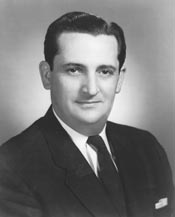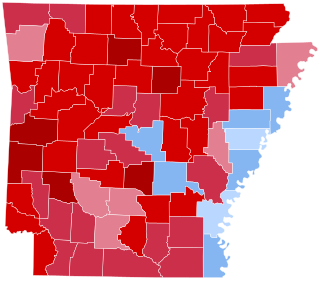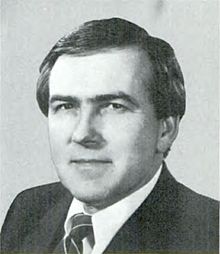
Searcy County is a county located in the U.S. state of Arkansas. As of the 2020 census, the population was 7,828. The county seat is Marshall. The county was formed December 13, 1838, from a portion of Marion County and named for Richard Searcy, the first clerk and judge in the Arkansas Territory. The city of Searcy, Arkansas, some 70 miles away, shares the name despite having never been part of Searcy County. The county is an alcohol prohibition or dry county.

Frank Durward White was an American banker and politician who served as the 41st governor of Arkansas. He served a single two-year term from 1981 to 1983.

Michael Avery Ross is an American businessman and politician. A member of the Democratic Party, he served as the U.S. representative for Arkansas's 4th congressional district from 2001 to 2013 and was his party's nominee for governor of Arkansas in 2014. He is currently the last Democrat to have represented Arkansas in the House of Representatives. He was also a member of the Arkansas Senate from 1991 to 2001, a member of the Nevada County Quorum Court from 1983 to 1985, and a small business owner.

Thomas Dale Alford Sr. was an American ophthalmologist and politician from the U.S. state of Arkansas who served as a conservative Democrat in the United States House of Representatives from Little Rock from 1959 to 1963.

Mickey Dale Beebe is an American politician and attorney who served as the 45th governor of Arkansas from 2007 to 2015. He remains the last member of the Democratic Party to serve as Governor of Arkansas.

The Democratic Party of Arkansas is the affiliate of the Democratic Party in the state of Arkansas. The current party chair is Grant Tennille.
The Delaware Democratic Party (DelDems) is the affiliate of the Democratic Party in the U.S. state of Delaware. It is headquartered in New Castle County and chaired by Erik Raser-Schramm.

Edwin Ruthvin Bethune Jr., known as Ed Bethune, is an American lawyer, lobbyist, and novelist in Little Rock, Arkansas, who was a Republican member of the United States House of Representatives from Arkansas from 1979-1985.

Edward Sheffield Nelson, known as Sheffield Nelson, is an American attorney, businessman and politician from the capital city of Little Rock, Arkansas. Originally a Democrat, Nelson in 1990 ran for governor of Arkansas as a Republican against then governor and future U.S. President Bill Clinton and in 1994 against another Democrat, the incumbent Governor Jim Guy Tucker.

Aylmer Lynn Lowe, known as A. Lynn Lowe, was an American businessman and politician from Garland near Texarkana in Miller County in southwestern Arkansas, who was a major figure in the Arkansas Republican Party. He was the Republican gubernatorial nominee in 1978 against the Democrat Bill Clinton, served as state party chairman from 1974 to 1980, and was the GOP candidate in Arkansas's 4th congressional district in 1966, having been defeated by the Democrat David Pryor, then a state representative and a future governor and U.S. Senator, originally from Camden in Ouachita County in south Arkansas.

Arkansas's 2010 general elections were held November 2, 2010. Primaries were held May 18, 2010 and runoffs, if necessary, were held November 23, 2010. Arkansas elected seven constitutional officers, 17 of 35 state senate seats, all 100 house seats and 28 district prosecuting attorneys, and voted on one constitutional amendment and one referred question. Non-partisan judicial elections were held the same day as the party primaries for four Supreme Court justices, four appeals circuit court judges, and eight district court judges.
The State government of Arkansas is divided into three branches: executive, legislative and judicial. These consist of the state governor's office, a bicameral state legislature known as the Arkansas General Assembly, and a state court system. The Arkansas Constitution delineates the structure and function of the state government. Since 1963, Arkansas has had four seats in the U.S. House of Representatives. Like all other states, it has two seats in the U.S. Senate.

The 1988 United States presidential election in Arkansas took place on November 8, 1988. All fifty states and the District of Columbia, were part of the 1988 United States presidential election. State voters chose six electors to the Electoral College, which selected the president and vice president.

The 1990 Arkansas gubernatorial election took place on November 6, 1990.
Wallace Townsend was an American lawyer who was from 1928 to 1961 the Republican national committeeman for the U.S. state of Arkansas. When he left his party's national committee, he was succeeded by Winthrop Rockefeller, who was elected five years thereafter in 1966 as the state's first Republican governor since the Reconstruction era.
Marshall Ney Chrisman Jr., is a businessman from Ozark in Franklin County in northwestern Arkansas, who served from 1969 to 1970 as a Republican member of the Arkansas House of Representatives. For a single term, he represented Franklin and neighboring Johnson counties. In 1980 and 1982, Chrisman fell far short in primary bids against Frank D. White for the Republican gubernatorial nomination.

A general election was held in the U.S. state of Arkansas on November 4, 2014. All of Arkansas' executive officers were up for election as well as a United States Senate seat, and all of Arkansas' four seats in the United States House of Representatives. Primary elections were held on May 20, 2014, for offices that need to nominate candidates. Primary runoffs, necessary if no candidate wins a majority of the vote, were held on June 10, 2014.

The 2020 United States presidential election in Arkansas took place on Tuesday, November 3, 2020, as part of the 2020 United States presidential election in which all 50 states plus the District of Columbia participated. Arkansas voters chose six electors to represent them in the Electoral College via a popular vote pitting incumbent Republican President Donald Trump and his running mate, incumbent Vice President Mike Pence, against Democratic challenger and former Vice President Joe Biden and his running mate, United States Senator Kamala Harris of California. Also on the ballot were the nominees for the Libertarian, Green, Constitution, American Solidarity, Life and Liberty, and Socialism and Liberation parties and Independent candidates. Write-in candidates are not allowed to participate in presidential elections.















